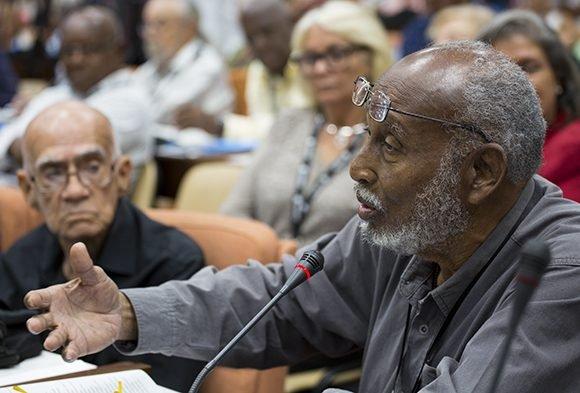Granma 299
In the US anything goes against dissidents

In the US anything goes against dissidents
Any threat to the status quo of capital will cause all cannons to be used to quell the “rebellion”

The list of activists, musicians, managers and promoters who died in strange circumstances is enormous. One of those cases is that of John Lennon. Photo: BOB GRUEN/EMI
The list of activists, musicians, managers and promoters who died in strange circumstances is enormous. Jimi Hendrix died from a drug overdose when he was no longer a drug addict; John Lennon, Michael Jeffrey, Donald Rex Jackson, Elvis Presley, Buddy Holly, Otis Redding, Janis Joplin, Jim Morrison, Mama Cass, Keith Moon, John Bonham, Bob Marley and Sal Mineo make up an index of more than 50 artists killed in situations doubtful
Alex Constantine, in the book Covert War on Rock, states that “intelligence sectors responded to the anti-war and civil rights movements by carrying out a program of covert assassinations.”
Provocative elements infiltrated the main civil rights organizations of anti-war, student, youth, feminist and political minorities. Each and every one of those identified as enemies of the system was subjected to close surveillance.
They planted false stories; They launched apocryphal proclamations of a violent or racist nature; They used disinformation to hold events and meetings in which false addresses or double summons were sent, and the content of the letters was changed to create discontent and internal divisions among the members and activists of the groups.
The leaders were blackmailed, the leaders were constantly harassed, false groups were created with undercover agents to carry out actions that provoked rejection in the population. Nothing was left to chance.
In 1971, the Police and the National Guard, summoned by Ronald Reagan, then governor of California, forcibly repressed the students of the University of Berkeley, who, together with various volunteers, had built the People’s Park in 1969. The The park was razed and, on top of it, a multi-story car park was built, in an attempt to erase the symbol of unity and utopia from the imagination.
With similar purposes, woodstockmania was created, a big business that sold thousands of records; Rock entered the circuit, attempts were made to domesticate it, make it commercial. Long hair, jeans and sandals became fashionable.
Propaganda accentuated the negative side of the counterculture, sold the image of drug addiction, psychedelia, and alcoholism, distorting the essence of the anti-war fight, of the fight against racial discrimination, against the intolerance of the system. Everything was perfectly framed in sex, drugs and rock and roll.
The CIA and the FBI worked together to prevent, at all costs, the fusion of the Black Political Revolution and the White Cultural Revolution.
This entire gigantic apparatus of covert war was also going to be directed against revolutionary Cuba. The CIA would do everything possible to avoid meeting points between Cuban socialism and the American counterculture.
Source: Imperialism of the 21st century: The culture wars.
Dinosaurs roar in the United States


FROM THE “LEGITIMATE” RIGHT TO BUY FIREARMS TO THE BAN ON ABORTION
Dinosaurs roar in the United States
Whoever stops just for a moment to take a look at the panorama of American society in these times, will discover the depth and extension that the most ultraconservative and retrograde thinking has reached.
Translated and edited by Walter Lippmann for CubaNews.

With a population of 319 million inhabitants, there are around 310 million guns in circulation in the United States, almost one per capita. Photo: Taken from perfil.com
The President of the United States, Joe Biden, gave legal status to the agreement approved by Congress that minimally restricts access to guns.
By signing the document, Biden took a step considered by many Americans as necessary, but insufficient, on the road to putting an end to the massacres caused by the promotion of violence and the indiscriminate sale and use of firearms.
It is important to note, because of its contradictory nature, that the June 23 congressional approval of this agreement was preceded by a U.S. Supreme Court ruling that expands the right to bear arms.
The Supreme Court ruled to overturn a New York State gun ownership law, enacted more than a century ago, that placed restrictions on carrying firearms in public.
This decision may have implications in seven other states with similar laws: California, Delaware, Hawaii, Maryland, Massachusetts, New Jersey and Rhode Island.
New York Governor Kathy Hochul called the Supreme Court’s ruling “outrageous” and “reckless,” according to CNN.
It is worth noting that there are about 310 million guns in circulation in the northern nation. With a population of 319 million, that means that almost every American owns a gun, regardless of age.
A few hours after the Uvalde massacre, considered -after the Sandy Hook elementary school shooting in Newtown, Connecticut- as the deadliest in U.S. history, the National Rifle Association (NRA) held its annual convention, which was attended, among others, by former President Donald Trump and Senator Ted Cruz.
In the speeches of both politicians, highly committed to the NRA, ideologically, business-wise and, above all, politically, they criticized the Democrats’ proposal to push for stricter gun legislation.
Ted Cruz went so far as to propose increased security in schools, placing armed guards to deal with shootings.
Many interests are at work behind politicians’ support for the NRA. From the coffers of the powerful association flow the money that finances electoral campaigns, bills and vetoes against anyone who tries to limit the business.
When guns cease to be a profitable vein that finances careers and buys consciences, the path will begin to clear, the chants of death and the macabre hymn of gunfire will cease.
CONSERVATIVES CELEBRATE
The U.S. Supreme Court also overturned the landmark 1973 ruling, known as Roe v. Wade, which determined that the right to abortion was a constitutional guarantee in the United States.
Ending this constitutional right is the result of a long-standing campaign by the nation’s most backward sectors, especially conservative Christians.
After it was confirmed, Trump called the decision “the greatest victory for life in a generation”; meanwhile, former Vice President Mike Pence expressed, “We must not rest and we must not relent until the sanctity of life is restored to the center of American law in every state in the country.”
On the other side, President Joe Biden, taking advantage of the circumstances, in an address to the nation, pointed out that the only way Americans can protect abortion rights is by voting for Democrats in the November mid-term elections, reported BBC, and the leader of the Democratic majority in the Lower House, Nancy Pelosi, called the Supreme Court ruling an “insult” to women.
The non-profit association, Planned Parenthood, described the decision to overturn Roe v. Wade as “dangerous” and “unprecedented”, as it will leave 36 million women of reproductive age unprotected, according to La Opinión.
Prior to the decision, access to this right was already out of reach for many women in the United States.
“This contrasts with many countries, including those in Western Europe, which offer access to subsidized, fully funded abortion services, universal health care, contraception and broader social programs,” said Risa Kaufman, director of U.S. Human Rights at the Center for Reproductive Rights.
It should be noted that this is not just in Europe. Closer to home, Cuba, the Caribbean island labeled a “dictatorship” by Washington, was the first country in Latin America and the Caribbean to decriminalize abortion. In the Greater Antilles, abortion has been free and legal since 1961, and in 1965 the legal basis was created so that it could be performed within the framework of the National Health System.
THE COURT’S IMPARTIALITY IN QUESTION
Another ruling by the U.S. Supreme Court demonstrates the bias and ultraconservative bias that prevails in its decisions.
On June 27, the Court recognized the right of teacher Joseph Kennedy, a soccer coach at a school in the Bremerton, Washington, school district, to pray with his students at midfield after the game.
The Supreme Court ruled against the School District and in favor of Kennedy, who demanded the right to pray with his players after games at the 50-yard line. The decision significantly erodes the separation of church and state in public schools.
The school had determined that Kennedy’s practice violated the students’ religious freedom rights, and also created a security risk at the games, because the teacher had orchestrated a public spectacle by inviting the media and local politicians to attend; while Kennedy claimed that the school’s actions violated his free speech and free exercise rights.
The American Civil Liberties Union of Washington filed a brief with the Court, arguing that Kennedy’s prayers are not protected by the Free Speech Clause.
Students stated that they were forced to pray, and one player explained that he participated against his own beliefs, for fear of losing playing time if he refused.
We refer to the country that took centuries to classify lynching as a federal hate crime. For years, attempts were made, to no avail, to punish mob killings, of which people of African descent and other minorities were the main victims.
More than 4,400 African Americans were executed in the United States as a result of this practice between 1877 and 1950 alone, as documented by the Equal Justice Initiative.
The crimes were committed with impunity, often in public places and in broad daylight, and also affected, albeit to a lesser extent, other minorities such as Native Americans, Asians and Mexican migrants.
The division within the U.S. is becoming more and more pronounced; some even speak of a schism, of insurmountable polarization, of possible balkanization. The truth is that the borders between one and the other are very clearly distinguishable.
Whoever stops just for a moment to take a look at the panorama of American society in these times, will discover the depth and extent to which the most ultra-conservative and retrograde thinking has reached.
He will hear, amidst the paraphernalia of political showmanship and gunfire, the deafening roar of the dinosaurs that refuse to disappear.
Nancy Morejón: Regarding George Lamming

Regarding George Lamming
Translated and edited by Walter Lippmann for CubaNews.

George Lamming (1927-2022), the great writer, dean of the narrators and thinkers of the English-speaking Caribbean, has just died on the island of Barbados, his native land. It would seem that the torrential waters of the beginning of June wanted to put an end to his long and immense life experience and, also, to his exceptional literary production, which began with indisputable resonance in 1953, when his classic novel En el castillo de mi piel [In the Castle of My Skin] appeared, translated by María Teresa Ortega and prologued by Emilio Jorge Rodríguez, and splendidly integrated the editorial catalog of Casa de las Américas (1979), in its prestigious collection dedicated to Latin American literature, which included titles by authors such as the Brazilian Guimaraes Rosa, the Jamaican Roger Mais and the Paraguayan Augusto Roa Bastos.
In the years he served as an advisor to the Casa’s Center for Caribbean Studies, I learned from his erudition and his conscience, which went hand in hand. His sense of regional integration went beyond vested, economic or even personal interests. He was a good conversationalist, a spontaneous communicator. I once heard him say: “In the Caribbean, there is always a ship arriving or leaving. And also: “The best economists of our archipelagos are the housewives… that is to say, the humble women; I admire them, I love them because they put their ancestral magic into practice”.
Lamming belonged to a type of intellectual with a high sense of the function of literature and the arts as vehicles of communication and recognition of the plural identity that defines the multicultural character of the region. It was not by chance that he was part of the New World group that defended the right to avant-garde art, although never detached from a morality at the service of a more advanced, more independent and better world. With enormous rigor and a proverbial literary excellence, his stories, his novels, transpire the yearning for freedom and regional integration in a frank struggle against colonial oppression that, in his pages, also acquires a continental vocation that we still need to understand today.
He wrote books that we will never be able to do without again, and although fiction is the key to his literary experience, the truth is that he reflected and compiled a sum of allegories, reasonings and debates on exile that are today a school, a method and, thus, a call to the indomitable being of Caribbean people throughout all the archipelagos. London and Georgetown were put in their rightful place. That is the grace and intellectual restlessness that reigns in The Pleasures of Exile (1960), whose lesson Roberto Fernandez Retamar revered in his also classic essay Caliban (1979).
George Lamming is and will continue to be -like Wilson Harris, Vic Reid, Derek Walcott, among others, including the extraordinary musician popularly known as Mighty Sparrow- a sacred patriarch of our culture, especially when the popular is installed, by its own right, in the impassable place where the most legitimate flags of independence fly forever.
Summit of exclusion vs. Summit of the Peoples

Summit of exclusion vs. Summit of the Peoples
The high-level session of the IX Summit of the Americas begins tomorrow in Los Angeles, California.
Translated and edited by Walter Lippmann for CubaNews.

From the diversity of ideas, the People’s Summit tries to raise as many voices as possible, without exclusions based on political interests; that is the difference between one Summit and the other. Photo: taken from Dominio Cuba’s Twitter feed.
The high-level session of the IX Summit of the Americas begins tomorrow in Los Angeles, California. The United States is once again hosting the conclave, after the first one in Miami in 1994. But hosting has been a bit too big for them, because for “their Summit” they not only took too long to send out invitations or to tangle organizational issues, but instead of focusing on discussing the real problems affecting the region with all those involved, they decided to put on the veil of “democracy” to exclude and, as a consequence, several leaders informed their disagreement with the decision, or announced that they would simply not participate.
On the other side will be the Summit of the Peoples and for Democracy, which will begin on the same day. But this one has not counted on the consent and good will of the US government, nor will it be held in large halls like the Summit of the Americas. On the contrary, last Friday, a group of ultra-right-wingers broke into one of the premises where the event is being coordinated, with the aim of occupying the space through the use of violence.
“For an hour we were defending our space, in the middle of that the police arrived, and instead of preventing what they were doing, they only observed and did not intervene in any way. What’s more, they prevented us from removing these extreme right-wing activists,” Manolo de los Santos, co-director of The People’s Forum, one of the U.S. organizations in charge of preparing the People’s Summit, told Granma in an exclusive interview.
He said that the attack was not only against their space, “but also against what it symbolizes, which are the socialist ideas, the work with the communities and the workers’ struggles”.
De los Santos told our newspaper that the organizational team continues with their minds and morale high, that they have received signs of solidarity from different parts of the world. “This type of attack is a phenomenon that the left has to face today,” he denounced.
Regarding the Summit of the Peoples and for Democracy, he explained that there are already more than 225 groups that will attend to interact in the official program, which includes panels and cultural activities.
“We are very motivated because we have already confirmed the presence of more than a thousand people, while many more are expected to participate in the demonstration on June 10, which we have called the March against the Exclusion Summit.” It is important to remember that this mobilization will take place after much negotiation with the Federal Government in Los Angeles, which, at first, denied permission.
He pointed out that, under the political umbrella of the Summit, other actions will take place in the city, related to the defense of the Amazon, in favor of Cuba and Venezuela, the right to housing and for [the rights of] immigrants.
“The important thing for us in this process of organizing the People’s Summit is to break with these policies of exclusion, to achieve greater social cohesion of popular movements, trade unions and the peoples who are in struggle in our continent,” said Manolo de los Santos.
This is an event that, despite the diversity of ideas, tries to raise as many voices as possible, without exclusions based on political interests; that is the difference between one Summit and the other.
Los Angeles and the prelude to a Summit

Los Angeles and the prelude to a Summit (+ Video)
Some Miami-based anti-Cuba hate-mongers, especially in the South Florida media, have begun to appear, announcing their attendance to the Summit.
Translated and edited by Walter Lippmann for CubaNews.

In Los Angeles, three out of four homeless people have no bed in any shelter or temporary solution. PHOTO: AP
Prelude to the Summit of the Americas in Los Angeles, United States, at the end of the first weekend of June, the meeting continues to suffer from a “strange” silence on the part of its hosts and, except for a last-minute invitation to the President of the Spanish government to attend as Joe Biden’s guest -is it that Spain is in America?-, little is known about the subject.
The invitation from across the seas is focused on the issue of migrants. I am not very convinced that Biden’s power of persuasion can involve a country in this issue that continues to lead the European Union in unemployment, with a rate of 13.3%.
The U.S. administration hopes that Spain will agree to double or triple the number of temporary workers from Central America, according to Axios.
Regarding the participation of the President of Mexico, Andrés Manuel López Obrador [AMLO], it was reported that the U.S. President wishes his Mexican counterpart to accompany him in person at the meeting.
López Obrador has stated that, if Washington does not invite all the countries of the Americas to the Summit, he would not cancel his nation’s participation in the event, but would send his representative, the Minister of Foreign Affairs.
Also in the last few days, especially in the South Florida press, some Miami-based anti-Cuba hate-mongers have begun to appear, announcing their attendance at the Summit. The publications do not explain whether they are part of the so-called civil society, knowing that they are counter-revolutionaries of Cuban origin.
The rest of this poorly made movie has been put in the hands of the media related to its organizers so that they can “make a fuss” about the ups and downs and manipulations of the hosts, which are not at all transparent.
For the Spanish newspaper El País, the city is “the misery capital of the United States”, and argues that the number of “homeless” people there has increased by 23% in one year, and details that three out of four homeless people do not have a bed in any shelter or temporary solution.
Across the United States, there are 553,000 people sleeping on the streets.
According to the RT website, the “hidden face” of Los Angeles is its poverty rate. It is estimated that there are about 66,433 homeless people in the city, and the African-American population continues to be the hardest hit by this scourge, if one compares the proportion of 33.7% with the total population, since this community only represents 7.9% [of the whole].
ATTACK AGAINST THE PEOPLE`S FORUM REJECTED
The attacks against the headquarters of The People’s Forum, in New York City, have been rejected by institutions and social movements that warn of the action of right-wing groups in the United States, with the support of the police.
“From Casa de las Americas we send all our support and solidarity to the members of The People’s Forum (TPF), whose headquarters in New York City has been the object of an illegal attack by reactionary forces of the extreme right”, a communiqué from this institution states.
According to Prensa Latina reports, more than a dozen New York Police Department agents entered TPF without being invited and acted as security for the extreme right-wing, which carried out the illegal attack.
The Cuban Institute of Friendship with the Peoples (ICAP) expressed its strong rejection of the aggression against the organization.
It is noteworthy that this attack takes place when many TPF staff and leadership members are in Los Angeles organizing the People’s Summit for Democracy, ICAP stressed.
20 years after Bowling for Columbine…

20 years after Bowling for Columbine, no one is listening
The thesis that the link between the American people and firearms engenders irrational violence continues to be valid.
Translated and edited by Walter Lippmann for CubaNews.
 American cinema, which for more than a hundred years glorified the law of the gun, has been forced to dress up to deal with the massacres that have occurred in the schools of that country. But analysis and warnings seem to have fallen on deaf ears, and not precisely because of artistic ineffectiveness.
American cinema, which for more than a hundred years glorified the law of the gun, has been forced to dress up to deal with the massacres that have occurred in the schools of that country. But analysis and warnings seem to have fallen on deaf ears, and not precisely because of artistic ineffectiveness.
Michael Moore sank the scalpel in his memorable documentary Bowling for Columbine (2002), acclaimed all over the world, and which would become a cultural reference for the nation based on shattering evidence: the link between the American people and firearms irremediably engendered acts of irrational violence.
The statistics offered by the filmmaker were shocking: 11,000 fatalities by firearms in one year. Today, when Bowling for Columbine is celebrating its 20th anniversary, one cannot help but be disturbed by the fact that, from the beginning of 2022 until the recent massacre in a school in Texas, five months ago, 17,202 people have died in the United States for the same reasons.
According to the Gun Violence Archive, since January of this year, there have been 213 “mass” shootings and ten “mass murders”.
Michael Moore did not hesitate to warn and predict the future in a documentary film about the 1999 massacre perpetrated by two students at Columbine High School in Littleton, Colorado, a region where 5,000 employees of the Lockheed arms company lived. “And if fathers make missiles,” the filmmaker brought out his proverbial irony, “it is not strange that sons wield shotguns”. And, unstoppable in his mordacity, he made public that a local bank was awarding an assault rifle to anyone who opened a new account.
Relating the culture of violence to the prevailing culture of fear in his country, Michael Moore embarked on a journey of inquiry that led him to interview actor Charlton Heston, [then] president of the National Rifle Association and symbol par excellence of the praises sung by Hollywood to the use of guns. It was an interview that revealed hypocrisy, especially when Heston was filmed speaking at a gun rally near a town where a six-year-old girl had recently been murdered by a schoolmate.
Numerous films have been made on the subject of killings in schools and other places, highlighting the ease with which murderers have access to high-powered firearms. Among them stand out Elephant (2003), by Gus Van Sant, awarded at Cannes and also inspired -in documentary and fiction key- by the events of Columbine; Let’s talk about Kevin (Lynne Ramsay, 2011) and Rudderless, (William H. Macy, 2014).
There is a long list of films that deal with topics related to the criminal event, such as harassment, racial and religious discrimination, social inequalities, xenophobia, social networks, video games, movies that ponder violence and the possible mental illnesses of the perpetrators, triggered or influenced, not infrequently, by all of the above. (Remember the massacre of 12 people in a Denver movie theater in 2012, during the premiere of a Batman film. When the police arrested the killer, a young man of 24, he identified himself: “I am The Joker”).
Judging by the legitimate expressions of pain, but also of helplessness, heard recently from U.S. leaders regarding the inability to reverse the current situation of many guns in the hands of those who claim the right to own them (as if the guns were toys), it is to be assumed, with horror, that new films about killings will have to continue to be made, or, in other words, art will once again be disqualified in the face of deafness.
Esteban Morales Domínguez has passed away

Renowned intellectual Esteban Morales Domínguez has passed away. (+ Video)
A member of the Union of Writers and Artists of Cuba and of the José Antonio Aponte Commission, in which he developed an intense work, he bequeathed an important series of essays in the field of the study of the links between Cuba and the United States.
Autor: Pedro de la Hoz | pedro@granma.cu
May 18, 2022 19:05:15 PM
Translated and edited by Walter Lippmann for CubaNews.

Esteban Morales Photo: Cubadebate
Renowned essayist, political scientist and professor Esteban Morales Domínguez died Wednesday at the age of 79, victim of a heart attack.
Through Twitter, the First Secretary of the Party Central Committee and President of the Republic, Miguel Díaz-Canel Bermúdez, wrote about the intellectual:
“The surprise death of Esteban Morales pains us. We will miss his intelligent, incisive and committed assessment of the problems of our time. My condolences to his family, friends and the Cuban intelligentsia, which he gave prestige to with his work”.
A member of the Union of Writers and Artists of Cuba (UNEAC) and of the José Antonio Aponte Commission, in whose bosom he developed an intense work, he bequeathed important written work in the field of the study of the links between Cuba and the United States.
Among the most significant titles in this field are Cuba-United States Relations: A Critical History and From Confrontation to Attempts at Normalization: U.S. Policy Toward Cuba, the latter in collaboration with essayist Elier Ramirez.
In another sphere, one of his books of greatest impact was Desafíos de la problemática racial en Cuba, published in 2007 by the Fernando Ortiz Foundation.
Morales’ intellectual career was linked to the University of Havana, where he was initially trained as an economist, devoted himself to teaching, and served as dean of the Faculty of Humanities and founding director of the Center for Studies on the United States.
Cuba condemns repression by Israeli forces

Cuba condemns repression by Israeli forces at funeral of slain Palestinian journalist
UN Secretary General António Guterres also criticized what happened at the funeral
Translated and edited by Walter Lippmann for CubaNews.
 A strong condemnation, on behalf of Cuba, against the cruel and inhumane behavior of Israeli forces during the burial of Palestinian journalist Shireen Abu Akleh, recently murdered, was posted on Twitter by Cuban Politburo member and Foreign Minister Bruno Rodríguez Parrilla.
A strong condemnation, on behalf of Cuba, against the cruel and inhumane behavior of Israeli forces during the burial of Palestinian journalist Shireen Abu Akleh, recently murdered, was posted on Twitter by Cuban Politburo member and Foreign Minister Bruno Rodríguez Parrilla.
“We reaffirm our invariable solidarity with the Palestinian people and their just cause,” said the Foreign Minister, who described as “cowardly” the murder of the Al Jazeera reporter, by Israeli forces.
UN Secretary-General António Guterres also criticized what happened at the funeral. Guterres said, through a spokesman, he was “deeply disturbed by the clashes between Israeli security forces and Palestinians gathered at Saint Joseph’s Hospital, and by the behavior of some police officers”.
================
TRANSLATION:
Our strongest condemnation of the cruel and inhuman behavior of the Israeli forces during the burial of journalist Shireen Abu Akleh.
We reaffirm our unwavering solidarity with the Palestinian people and their just cause.
https://twitter.com/BrunoRguezP/status/1525170140085637121
Díaz-Canel receives AMLO (+video)
Díaz-Canel received President of Mexico (+video)
During the fraternal meeting, both parties highlighted the good state of bilateral relations, which will reach their 120th anniversary on May 20, and expressed their willingness to continue deepening the bonds of brotherhood that unite us.
Translated and edited by Walter Lippmann for CubaNews.
 Foto: Estudios Revolución
Foto: Estudios Revolución
The President of the Republic of Cuba, Miguel Díaz-Canel Bermúdez, held official talks on Sunday with the President of the United Mexican States, His Excellency Andrés Manuel López Obrador, who is on a working visit to our country.
During the fraternal meeting, both parties highlighted the good state of bilateral relations, which will reach their 120th anniversary on May 20, and expressed their willingness to continue deepening the bonds of brotherhood that unite us. They also acknowledged the positive progress in economic-commercial, investment and cooperation relations, and ratified the will to continue strengthening these ties, taking advantage of the potential of both countries.
The Cuban President thanked Mexico for its historic support in the battle to lift the US economic, commercial and financial blockade against Cuba. The meeting was also an opportunity to highlight the existing cultural ties between Cuba and Mexico, which have deepened with the participation of the Aztec nation as the guest of honor at the 30th Havana Book Fair.
At the end of the talks, a Declaration between the Government of the United Mexican States and the Government of the Republic of Cuba and a Cooperation Agreement between the Ministry of Health of the United Mexican States and the Ministry of Public Health of the Republic of Cuba were signed.
The distinguished visitor was accompanied by His Excellency Mr. Marcelo Luis Ebrard Casaubón, Secretary of Foreign Affairs; the respective Secretaries of Health, National Defense and the Navy, Jorge Carlos Alcocer Varela, General Luis Cresencio Sandoval González and Admiral José Rafael Ojeda Durán; Lázaro Cárdenas Batel, Coordinator of Advisors to the President; and the Mexican Ambassador to Cuba, Miguel Ignacio Díaz Reynoso, among other officials.
Present for the Cuban side were the Minister of Foreign Affairs, Bruno Rodríguez Parrilla; Army Corps General Álvaro López Miera, Minister of Minfar; the Minister of Foreign Trade and Investment, Rodrigo Malmierca Díaz; the Minister of Public Health, José Angel Portal Miranda, and the Cuban Ambassador to Mexico, Marcos Rodríguez Costa, among other officials.
LÓPEZ OBRADOR RECEIVED THE NATIONAL ORDER JOSÉ MARTÍ
From the hands of President Díaz-Canel, this Sunday López Obrador was also awarded the José Martí National Order, the highest decoration granted by Cuba, for which he said he felt honored and grateful.
Díaz-Canel reaffirmed to his Mexican counterpart that “this was a desired, expected and longed-for visit, in which we can convey to him all the admiration, respect and affection you have here, for your expressions and gestures toward the Cuban people.
President Andrés Manuel López Obrador replied that it could already be, as writers say, a commonplace to talk about the friendship between Cuba and Mexico, but that he was here to reaffirm the brotherhood and solidarity between both peoples.
The Mexican President arrived in Cuba at dusk on Saturday, and accompanied by the Vice President of the Republic, Salvador Valdés Mesa, he began the Sunday day with the laying of a wreath at the monument to José Martí, in the Plaza de la Revolución.
Martí, he said shortly after, “I admire him as much as I admire Bolívar and our Juárez”.
After ten o’clock on a historic Sunday night, President Miguel Díaz-Canel Bermúdez bid farewell to Cuba’s dear friend. President Andrés Manuel López Obrador was returning to Mexico.
Jane Campion and female film directors

Jane Campion, the dog, and female film directors
Critics, audiences and festivals point to Jane Campion as the great favorite, one wonders what is happening in an industry traditionally dominated by men and their misogyny
Translated and edited by Walter Lippmann for CubaNews.

The Power of the Dog, by Jane Campion. Photo: Still from the movie
The fact that I am writing these lines hours before the 2022 Oscar ceremony forces us to establish that it would be a surprise if The Power of the Dog does not win the statuette for Best Picture, and others, considering the 12 nominations received.
It is already known that the Oscars have been an artistic-commercial construction dominated for years by the weight of the big industry, and by a scale of classic values typical of the cinema made in Hollywood, always with an eye on the weight of the box office.
Good films can be made, but when it comes to aspiring to the Oscars, do not expect marked aesthetic breakthroughs or proposals that subvert the established order “too much”.
However, along with this more of the same that tries to disguise itself as a renovator in the heat of the new times (Argo, Oscar 2013, Ben Affleck), there have been artistic contributions that have given prestige to the award, such as Roma (2018, Alfonso Cuarón), which before arriving at the Oscar ceremony dragged a trail of impressive international awards and recognitions, as has happened with The Power of the Dog, which again placed the New Zealander Jane Campion (The Piano) in stellar shots.
Considering that last year the coveted Oscar for Best Picture was won by the excellent Nomadland, by Chloé Zhao, a Chinese filmmaker living in Los Angeles, and now critics, audiences and festivals were pointing to Campion as the big favorite, one wonders what is happening in an industry traditionally dominated by men and their misogyny.
It is true that Zhao’s and Campion’s films, although released under the aegis of Netflix and involved in Oscar’s gear, are not representative products of classic Hollywood, but a review of the numbers suggests that, almost a century after command and control, and after resounding criticism of racism, sexism and other unworthy manipulations, the American Academy admits, with its actions, that it had been making a mistake in terms of equality and inclusive opportunities.
The statistics prove it: in 2011, only 5% of the films made in Hollywood were by female directors. In 2018, the figure reached 8%; in 2020, 20%; and in 2021, 17 %.
The percentage of female directors tripled in 15 years, but essentially with the prominence of white women, as there is hardly any room for minorities, while Black female directors do not exceed 2%, according to reports from the University of Southern California. The report speaks of the progressive, though still insufficient, changes in mentality on the part of the big Hollywood studios and the role of streaming platforms, more inclined to support that developing equality.
Asked by The Hollywood Reporter to what she attributed the transformations of recent years, Jane Campion said she gave credit “to the brave women who really blew the lid off Hollywood with their revelations about abuse and inequality. I think there’s been a lot of rethinking and a very active determination on the part of men and women to see that change.”
The Me Too movement started virally on social media in October 2017, feminism in general, LGBTI issues, and the campaigns for equality present in the international arena have been instrumental in gradually shaking off the old cobwebs that for decades marginalized women in Hollywood.
Other cinematographies have not escaped the influence of women, including screenwriters, actresses, photographers and technicians, who have been reiterating with their performances that talent has no gender.
An old struggle in full swing in which the veteran Jane Campion returns with The Power of the Dog, a western shot in New Zealand -which we will talk about later-, to demonstrate that, in the house of the spinning top, it can be a foreign director who dances best.
Subscribe to Blog via Email
| M | T | W | T | F | S | S |
|---|---|---|---|---|---|---|
| 1 | 2 | 3 | 4 | 5 | 6 | |
| 7 | 8 | 9 | 10 | 11 | 12 | 13 |
| 14 | 15 | 16 | 17 | 18 | 19 | 20 |
| 21 | 22 | 23 | 24 | 25 | 26 | 27 |
| 28 | 29 | 30 | 31 | |||


You must be logged in to post a comment.